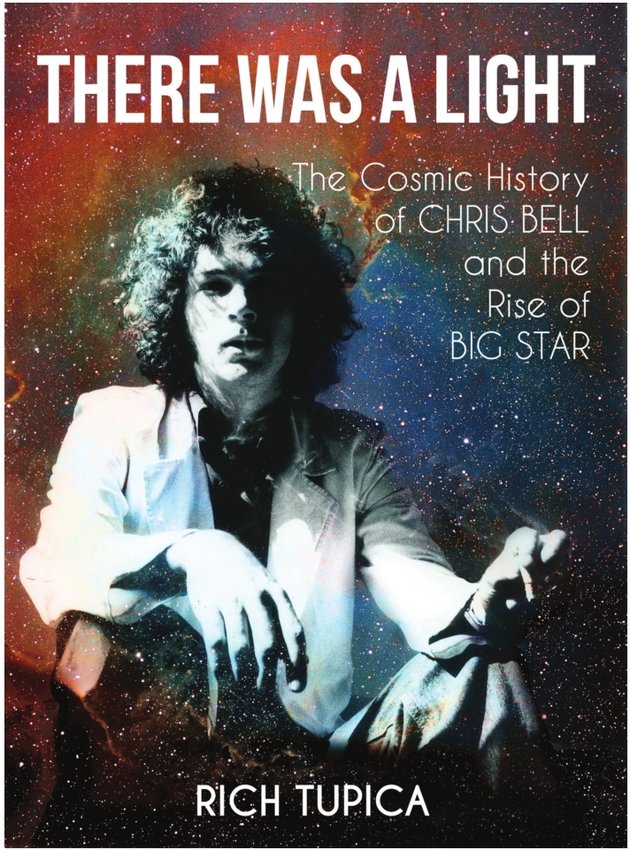
Rich Tupica, author of City Pulse’s “Turn it Down” section, caught an obsession with Chris Bell, singer/songwriter of the fabled Big Star — one of rock ‘n’ roll’s most celebrated cult bands. Bell, who died at 27, never witnessed Big Star’s posthumous rise from obscurity into legend status and critical acclaim.
Until now, little information was available about what happened to Bell after he left Big Star in 1972. After spending several years interviewing Bell’s surviving family members and friends, Tupica has completed a comprehensive book that demystifies the legendary songwriter’s life and music career.
“There Was a Light: The Cosmic History of Chris Bell and the Rise of Big Star” is available for purchase on Amazon and www.hozacrecords.com
How did this project start?
Around 2012, or 2013, I was going to write a feature story about Bell for a magazine called American Songwriter. When I started writing it, I got more and more interested in Bell. Based on the few people I talked to, I sensed there was a lot of mystery surrounding him. I actually ended up not even submitting the story. I just ended up saying, ‘Hey, I’m going to turn this into a book.’
Who did you reach out to for stories about Chris Bell?
My first outreach was to Ardent Studios, which is where all of the Big Star stuff was recorded — it’s actually still in business. I started talking with John Fry, who produced the band and owns the studio. He produced records for all sorts of people. He’s kind of a Memphis legend.
I also started talking with Jody Stevens, who is the last surviving member of Big Star. The rest of them have passed away. Eventually, I got in touch with David Bell, Chris’ older brother.
What was it like working with David Bell?
David knew Chris well, he was 5 years older than him. He was old enough to remember everything about Chris; he remembered going into the hospital the day Chris was born, and luckily, for some reason, David took a liking to me.
He decided to help me out with the book, and he kept talking to me and he kept helping me. David is kind of notorious for being fairly selective of who he does interviews with. It’s his brother, and he doesn’t talk to everybody who calls up and wants to do an interview about Big Star.
If it wasn’t for David Bell or John Fry, who passed away in 2014, certain people would’ve never spoken with me. They vouched for me. Fry would call people up and say, “You should talk to this Rich guy.” And I really don’t know why.
How did you balance the focus between Big Star and the personal life of Chris Bell?
This is kind of a book for record nerds, power pop geeks and Big Star fanatics. But I tried to get as many humanizing stories about Chris as possible.
The little amount of information that was out there before this book came out was all kind of one dimensional. There’s been a couple of books written about Big Star, but there was nothing too in-depth that told who Chris was: What made him angry and what made him happy.
Chris notoriously had some issues. Right before he left Big Star in 1972, he essentially had a nervous breakdown and was hospitalized. While he got some mental issues straightened out, he still dealt with drug issues.
He was clinically depressed. He was struggling to know who he truly was, and whether he was straight or gay. He also started to get really heavy into Christianity and he became a born again Christian. There was a tornado of emotions and complex drug abuse surrounding him.
I tried to go through all that and lay it out the best that I could: How it all slowly happened and what happened after that.
Big Star is one of the main examples of a band that became famous long after it broke up. Can you explain that phenomenon?
There’s a quote on the back of the book from Pitchfork that says, ‘Big Star aren’t just rock’s greatest cult band, they’re arguably rock’s first cult band.’ That’s fairly true — it was a big cult following. There’s people that came before them that had smaller cult followings, but Big Star’s cult following actually brought on some financial success. There’s lots of cult followings that aren’t really too financially successful. They don’t get the band on big fancy box sets, or get the band’s songs on ‘’That ‘70s Show.’’ Big Star’s cult status started when Chris was actually still alive. In 1977, 1978, there were already people overseas who were putting ads in the back of NME and Melody Maker writing, “Hey, I’m Looking for Big Star Records.” People were trading bootleg tapes, so it was already this kind of weird phenomenon, Big Star put out a great rock ‘n’ roll record, “No. 1 Record,” but there were distribution problems with their label Stax Records. There was just a big breakdown in their distribution — a lot of records didn’t end up making it into stores. Stax Records was good at selling soul records, and Big Star was one of the first records they put out, which featured a group of white guys playing rock ‘n’ roll music — it kind of got lost in the shuffle.
The people who did find it, we’re like, ‘Why doesn’t anyone else like this?’ People were like, ‘This record is great, I love it! But it’s not on the radio!’
Support City Pulse - Donate Today!
Comments
No comments on this item Please log in to comment by clicking here